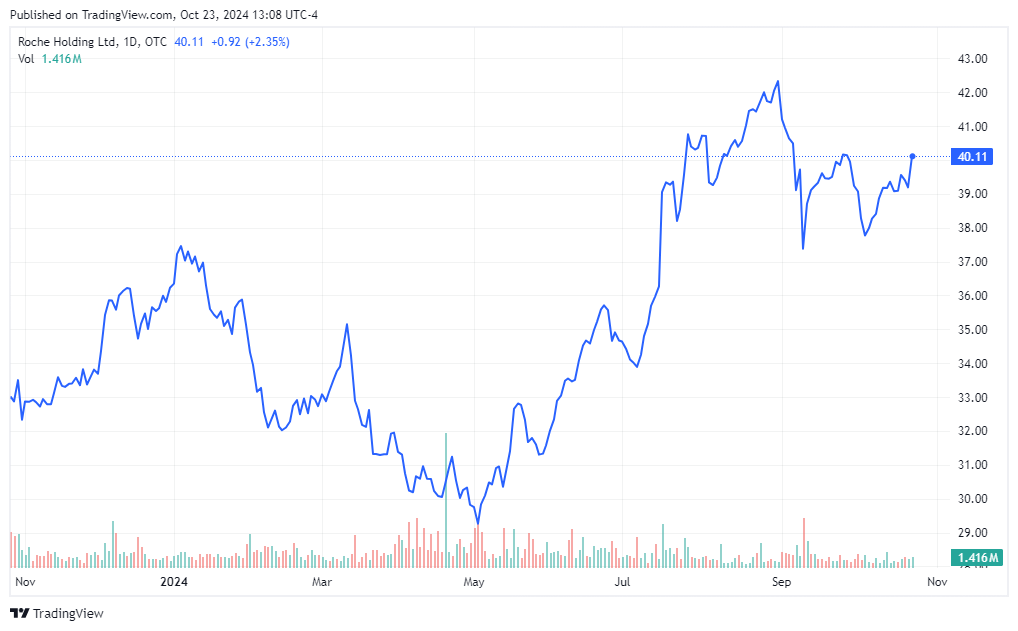- The Swiss pharma company Roche is developing an oral GLP-1 weight loss drug.
- An analyst at Deutsche Bank recently referenced a drug as a threat to Eli Lilly's competing treatment.
- The drug has shown some impressive efficacy in early results; do they make the stock a buy?
Over the last couple of years, one of the biggest stories in the stock market has been around pharmaceutical companies that are thriving due to the proliferation of their weight loss drug treatments.
The two firms that most readily come to mind are Eli Lilly (NYSE:LLY) and Novo Nordisk (NYSE:NVO). These firm’s GLP-1 receptor agonist drugs have seen skyrocketing sales due to their unprecedented ability to help patients lose considerable amounts of body weight in a relatively short amount of time.
This isn't surprising. In 2018, the Centers for Disease Control and Prevention (CDC) found that 73.6% of Americans over 20 are either overweight or obese. The massive increase in sales for these drugs has simultaneously led to eye-watering stock price increases for Lilly and Novo.
Due to this, many are paying close attention to which company will be next to develop a new and hopefully improved weight-loss drug that can lead to similar stock price success.
Deutsche Bank Analyst Calls Out Roche
One interesting distinction in the weight loss drug landscape is that of injectable drugs versus oral drugs. Lilly and Novo currently deliver their drugs Zepbound and Wevogy, via self-injections. However, research at these and other firms is working to develop weight loss treatments as a once-daily oral pill. It is believed that this method could expand the market for the drugs, as it provides an easier way to take the drug compared to an injection.
In an interview with Yahoo Finance, Deutsche Bank analyst James Shin singled out Roche Holding’s (OTC:RHHBY) drug “CT-996” when asked about which oral weight loss drug he sees as the biggest threat to Lilly’s developmental oral treatment. Due to this, it's pertinent to dive further into this drug to better understand what kind of opportunity the firm and the stock have as it relates to CT-996.
CT-996 Shows Promising Efficacy, But It’s Still in Early Innings
Let's examine CT-986's efficacy results. Overall, the actual ability to lose weight still reigns supreme over convenience for patients taking these drugs, assuming they have no serious side effects. In Phase I Food and Drug Administration (FDA) trials, researchers found that CT-986 resulted in an average body weight loss of 6.1% compared to the placebo in just four weeks.
This seems to be a much larger weight loss over the same period than Lilly's oral candidate, orforglipron (Figure 2A). It is also important to note that the drug's safety and tolerability were consistent with those of other oral GLP-1 receptor agonists.
These results are encouraging but also lead to significant questions. First, the company only released data after four weeks. This is a very short time frame; data for orforglipron is available for up to 36 weeks. However, it is from a Phase 2 trial, so that is to be expected. The CT-988 results were reportedly only based on the testing from six patients, a very low sample size.
Still, in four weeks, CT-996 patients, on average, lost almost as much weight as a 12-week trial of a competing drug by Structure Therapeutics (NASDAQ:GPCR). They also lost more than tirzepatide, the formal name for Lilly’s drugs Zepbound and Mounjaro, over four weeks (Figure 1B).
However, it is important to take these comparisons with a large grain of salt, as they are not taken from a head-to-head trial. It is possible that the faster titration, or increase in dose size over the period of the trial, helped artificially generate faster four-week weight loss compared to the other trials, which had longer durations. However, the company disputes this idea.

Source: TradingView
Keeping Eyes on CT-996
At this point, it feels too early to jump in on Roche based on CT-996. The results look good so far, but there is still a huge amount of uncertainty around the treatment. The company is currently completing the final stage of its Phase 1 trial and intends to begin Phase 2 in 2025.
Seeing the results of CT-996 over a longer period will be key to understanding how effective the medicine can truly be and what kind of commercial success it could potentially have. A successful weight-loss drug would greatly benefit a company with unimpressive sales growth in recent quarters. I'll be staying abreast of developments around CT-996 and other weight-loss drugs.
